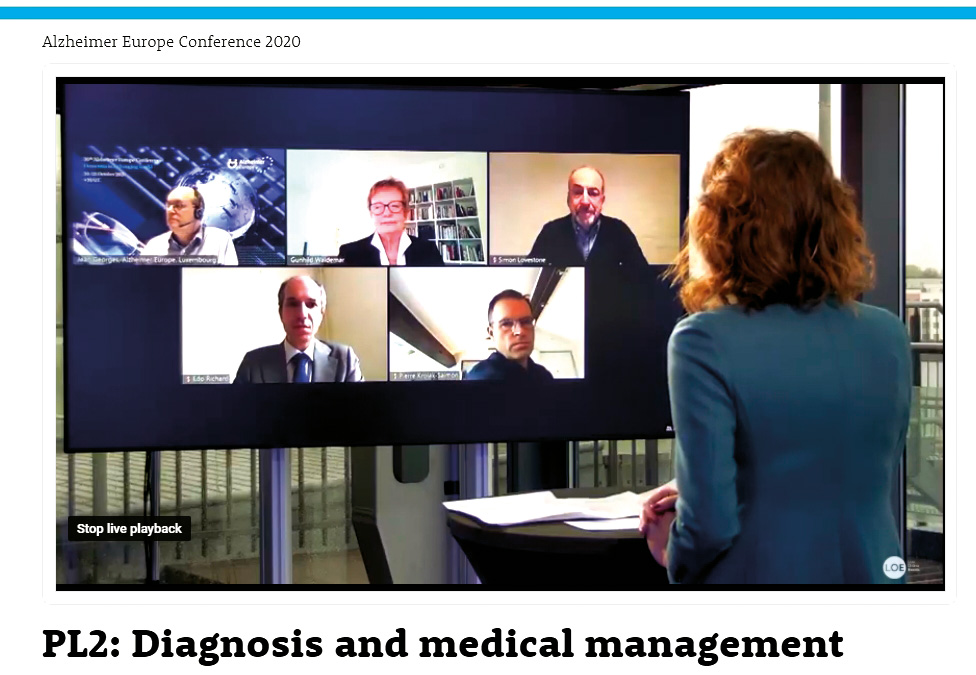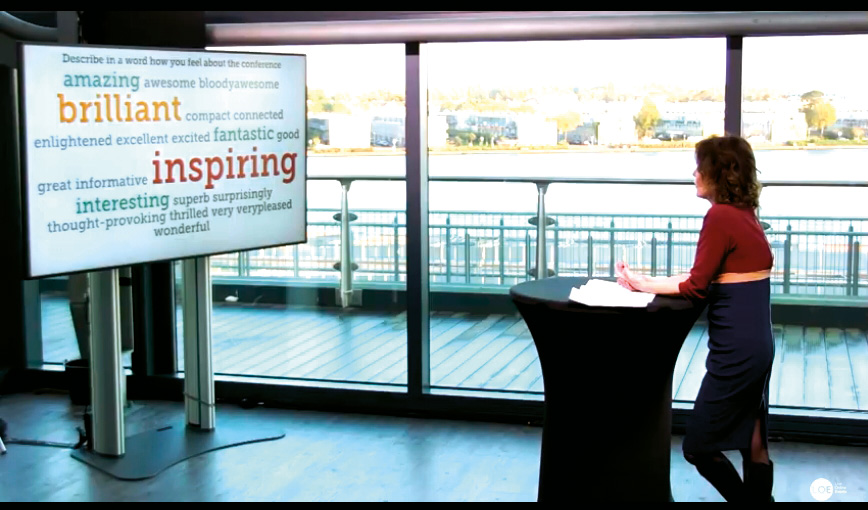
The 30th Alzheimer Europe Conference (#30AEC) was held online from 20-22 October 2020. Almost 800 participants from 42 countries attended, and 260 speakers and 100 poster presenters shared their research, projects and experiences in an atmosphere of collaboration and solidarity, against the backdrop of the global COVID-19 pandemic.
Iva Holmerová, Chairperson of Alzheimer Europe opened the conference, extending a special welcome to the 35 people with dementia among the delegates, as well as their supporters. Delegates were also welcomed by Helen Rochford-Brennan, outgoing Chairperson of the European Working Group of People with Dementia (EWGPWD) and Myrra Vernooij-Dassen, Chairperson of INTERDEM. As part of this year’s new conference format, Alzheimer Europe organised two plenary roundtable sessions, in lieu of keynote lectures. The first of these, “Dementia in a changing world”, saw a panel discussion including Adelina Comas Herrera, co-lead of the Strengthening Responses to Dementia in Developing Countries (STRiDE) project; Mario Possenti, general secretary of Federazione Alzheimer Italia; Helen Rochford-Brennan and Lennert Steukers, Associate Director, Janssen Neuroscience Team.
Panellist Adelina Comas-Herrera, Care Policy and Evaluation Centre, London School of Economics and Political Science, referred to an updated report she co-authored, for which data was collected regarding the impact and mortality of COVID-19 in people living with dementia in nine countries. The percentage of people with dementia in care homes, whose deaths were linked to COVID-19, ranged from 29% to 75% across those countries. The ban on visits to care homes across the world has kept people with dementia detached from essential affective bonds and from the provision of family care, for many months. There is a pressing need, and also an opportunity for innovation. Guidelines and tools to support institutions and practitioners to respond better to the needs of people with dementia during the pandemic are needed as a matter of urgency, she stressed. Lennert Steukers emphasised that a number of stages of research have been impacted during the ongoing pandemic: Discovery/ preclinical work has suffered due to lab closures and technical unemployment of researchers; clinical work has been hit, with clinical trials being suspended or severely delayed, which may have an impact on data quality; and patient involvement has also been difficult due to travel restrictions and only limited face-to-face contact being possible. The clinical trial landscape has dramatically changed in terms of how these trials are being conducted and will continue to be conducted. He gave the examples of decentralised, remote and virtual trials, and pointed out some of the challenges this presents in the field of neurodegeneration. There has been a huge impact on the research community, he said, with a whole generation of researchers being affected, for instance due to fellowship schemes/research programmes being stopped.
The second plenary session of the conference was on “Diagnosis and post-diagnostic support” and opened with a presentation on “Improving the diagnosis of neurocognitive disorders: implementing the recommendations of the 2nd European Joint Action on Dementia”, given by Pierre Krolak-Salmon, President of the French Federation of Memory Centres. We are still facing an under-diagnosis of Alzheimer’s disease and dementia in the field of primary care in Europe, he stressed, noting that the Joint Action recommends new training programmes to help in the fight against the major diagnosis gaps present in primary care. He also shared that a new graduated and personalised diagnosis strategy had been adopted by the Joint Action, which can be adapted to any and all European countries. Finally, he said that advanced practice nurses could help to better detect neurocognitive disorders in primary care.

During the next presentation, on ethical issues linked to the disclosure of diagnosis, clinical Neurologist Edo Richard, offered a different perspective, highlighting the impact of a diagnosis and the importance of considering that “timely” diagnosis may not always be synonymous with early diagnosis. The introduction of a biomarker-based diagnosis of Alzheimer’s disease blurs the boundary between health and disease, he said. Finally, he highlighted the widening gap between research and clinical practice around diagnosis of Alzheimer’s disease. In the third presentation, Simon Lovestone, Vice-President, Disease Area Leader, Neurodegeneration, Janssen, looked at the pharmacological treatment of Alzheimer’s disease and at what we have learned in recent years. Developing therapies for Alzheimer’s disease is particularly challenging for many reasons, he said. The brain is the least understood organ in the body and the disease is inherently complicated, so there are a number of hurdles to overcome when doing clinical trials in this population. He also noted, however, that while clinical trials have not produced a disease-modifying drug, “we have gained tremendous knowledge from years of research and promising efforts are underway that it should only be a matter of time before we see therapies that should delay onset or progression of disease.”
The final presentation was delivered by Gunhild Waldemar, Professor of Neurology and Chair of the Danish Dementia Research Centre at Rigshospitalet, University of Copenhagen. She was one of the leading forces in the establishment of the new European Academy of Neurology (EAN) and her presentation, on medical management issues in dementia, shared the new recommendations from the EAN.
She began by pointing out that people with dementia are at increased risk of infections, malnutrition, incontinence, dehydration, adverse effects of certain medications, epileptic seizures, and neuropsychiatric symptoms, and said that medical conditions may go unnoticed in some cases. A lack of treatment, or mis-management of medical conditions may worsen symptoms of dementia, and lead to pain, physical disability, psychiatric symptoms, hospitalisations or even death, she continued.
The new EAN guideline, “Medical management issues in dementia”, was developed by a multidisciplinary working group with the aim of helping to guide physicians on five selected topics: The need for medical follow-up of people with dementia; when and how to treat severe psychiatric symptoms with antipsychotics; the treatment of epilepsy; of vascular risk factors; and of pain. The third plenary explored “Building dementia-inclusive societies”. Dianne Gove, Director for Projects at Alzheimer Europe, opened with a presentation on “Patient and public involvement approaches in dementia research: the experiences and contributions of the European Working Group of People with Dementia” (EWGPWD). Sabine Jansen, Executive Director, Deutsche Alzheimer Gesellschaft (DAlzG) shared some of the experiences of her organisation, with regards to promoting dementia-inclusive hospitals. The third presentation was given by Jacqueline Hoogendam, who is the co-ordinator for dementia policy and international affairs on Long-Term Care at the Ministry of Health, Welfare and Sport in the Netherlands. She listed some of the learnings from the Dutch dementia strategy • the “Deltaplan Dementie” – with regards to making Dutch society more dementia-friendly. The final presentation of plenary three was given by John Keady, who leads the inter-disciplinary Dementia and Ageing Research Team at the Division of Nursing, Midwifery and Social Work. He was the Chief Investigator on the multi-site ESRC/NIHR Neighbourhoods and Dementia Study and it was this study and the outcomes of the project which were the main focus of his talk.
The fourth plenary began with Carol Brayne, Professor of Public Health Medicine and Co-Chair of the Cambridge Public Health Interdisciplinary Research Centre in the University of Cambridge, giving a talk on the latest trends in the prevalence of dementia and discussing whether prevention messages are having an effect.
Dementia is changing across generations and within populations, she said. The evidence on prevention clearly points to the fact that primary prevention for dementia risk profiles for whole populations, combined with effective management of existing risk conditions in individuals, is the most effective strategy. On the other hand, she stressed that “there is no evidence that screening and early detection will be effective at present”. Up next, Alexander Kurz, senior scientist at the Department of Psychiatry, Klinikum rechts der Isar, Technical University of Munich and Director of the university’s memory clinic, shared some of the findings of “INDEED, an inter-professional intervention in dementia education for South-Eastern European countries”. Dementia is a complex disorder that can only be tackled by several health and social care professionals working together, he said. He also stressed that inter-professional shared education is key for collaboration and networking, and can take advantage of modern digital learning formats. The INDEED project provides an online e-learning programme, addressing multiple professions simultaneously and conveys a person-centred, holistic concept of dementia care, he summarised. In the third presentation, Dympna Casey, Professor and Head of School in the School of Nursing & Midwifery NUI Galway looked at assistive technologies and explored what the role of social robotics could be in dementia. Carlos Diaz, CEO of Synapse Research Management Partners and Coordinator of the IMI NEURONET project, was the final speaker in plenary four. He discussed the neurodegeneration portfolio of the Innovative Medicines Initiative (IMI), and looked at ways to ensure project results are converted to sustainable assets.
Globally, society is facing several highly complex, urgent challenges, and to be able to respond, he said, scientific research may need a paradigm change in how it is organised. A systems leadership approach is being explored in the IMI neurodegeneration portfolio and it is hoped this will help to propel scientific efforts towards the much-needed actionable results. The fifth and final plenary session took the form of a second roundtable discussion, this time revolving around “Maintaining dementia as a European priority”. Panellists included Maria Carrillo, Chief Science Officer, Alzheimer’s Association (US) global research programne; Dan Chisholm, Programme Manager for Mental Health at the WHO Regional Office for Europe, Nils Dahl, Senior Policy Advisor at Germany’s Federal Ministry of Health; Charles Scerri, Chairperson of the Malta Dementia Society, Vice-Chairperson of Alzheimer Europe and National Focal Point on Dementia in Malta; and Nicoline Tamsma, Policy Officer at the European Commission’s DG for Health and Food Safety, Unit Health Promotion, Disease Prevention, Financial Instruments.
The three-day conference also featured 24 parallel sessions and 6 special symposia on diverse topics for delegates to choose from. The three-day virtual conference was formally closed by Alzheimer Europe Chairperson Iva Holmerová. All delegates were invited to mark the dates of the next Alzheimer Europe Conference (#31AEC) in their calendars. “Building bridges” will take place in Bucharest, Romania from 29 November to 1 December 2021.
The 30th Alzheimer Europe Conference received funding under an operating grant from the European Union’s Health Programme (2014-2020).
